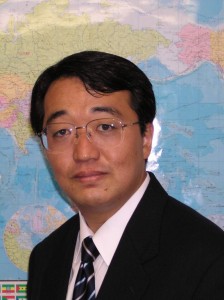緊張と統合:内村鑑三におけるキリスト教と日本の精神
このシリーズでは、私が1994年に執筆した統一神学大学院(Unification Theological Seminary)の神学課程修士論文(Divinity Thesis)を日英二か国語で掲載している。
6.無教会と日本社会の続き
以前に内村は日本の国に対して、神の摂理上における特別な運命を付与していたが、今や1895年と1903年の出来事の後には、彼は神の摂理に対する自らの楽観的な見方について再考せざるを得なくなった。彼は万国の歴史というものは、それが西洋文明にしろ東洋文明にしろ、偉大な人類の進歩の歴史であるとは言えない、というより悲観的な結論に至ったのである。
西洋と同様に日本においても道徳的文明が現実のものと成り得なかったことにより、内村は神の摂理に関してより極端な超越的見解を受け入れるようになった。それは彼のアメリカの老友であるダニエル・ベルが、キリストの再臨に関する千年王国説についての彼の本や記事を送ってくることによって唱道されたものであった。内村は、神が歴史に介入して来られ、その時「主御自身が世界を回心させるために下って来られるであろう」という、終末論的な概念に大きな慰めを見出した。
神の摂理に関するこのような概念は、彼の個人的な生および彼が住んでいる世界における全ての不調和を超越することを可能にしたばかりでなく、それらを是認することも無視することもなく、それらをその曖昧さと共に受け入れることをも可能にしたのである。千年王国説は、キリストの再臨まで何故「神が選ばれた者が・・・苦しまなければならない」のかを彼に説明した。彼の再臨の時まで、キリストに対する忠誠は人に「準備し」、そして「同胞達からの軽蔑と罵倒のまっただ中で・・・彼の証し人」となることを要求するのである。このようにして内村は「この世にありながらもこの世の者ではなくなった」のである。
D.内村以後のキリスト教
1931年、内村の死(1930)の直後に満州事変が勃発して、日本は軍国主義への道を歩み始めた。アメリカ合衆国と大英帝国が1930年代の日本の満州進出に対して反対したために、政府はキリスト教に対して疑念を持つようになった。なぜならその信仰はこれらの国々と切っても切れない関係にあるとみなされたからである。
政府は教会とキリスト教関係の機関に対して、外国の援助からの経済上、運営上の独立を要求した。また政府は、西欧から移行された教派の分裂を越えるべく教会の統合を押し進めた。1939年の宗教団体法によって、宗教は全ての面において政府の支配の下に置かれた。それは宗教団体に対する強力な官僚的支配を目的としたものであった。1940年には34のプロテスタント教会が、『日本基督教団』として統合させられた。ラトーレットは、日本基督教団は政府の圧力によってのみ生じたのではなく、その方向に向けた以前からの運動の純粋な努力が実ったものでもあると論じているが、大内はそれを本質的にナショナリズムへの降伏であったと見ている。
VI. Mukyokai and Japanese Society. (Cont.)
Because earlier he had gone so far as to attribute a special destiny in God’s providence to the Japanese nation, now after the events of 1895 and 1903 Uchimura was forced to rethink his optimistic view of history and divine providence. He concluded more pessimistically that the history of nations – whether those of Western of Eastern civilizations – could not be identified with the history of the progress of greater humanity.(28)
The failure of moral civilization to become a reality in Japan as well as in the West also required Uchimura to adopt a more radically transcendent view of divine providence, a view which his senior American friend, David Bell, advocated by his sending to him books and articles on the premillenial view of the second coming of Christ.(29) Uchimura found great comfort in this apocalyptic notion of a divine intervention into world history in which “the Lord Himself will come down to convert the world.”(30) This notion of divine providence not only enabled him to transcend all the incongruities in his own personal life and his world, but also to accept them in all their ambiguities without either legitimizing or ignoring them. The premillenial view of history explained to him why “His elect … must suffer” until Christ returned. Until His return, loyalty to Christ required one to be “ready” and to be “a witness for him… amidst continual buffering and revilings from [his] countrymen.”(31) Thus Uchimura could be “in the world but not of the world.”(32)
D. Christianity After Uchimura.
In 1931, right after the death of Uchimura (1930), the Manchurian Incident happened and Japan headed on the path to militarism. The opposition of the United Sates and Great Britain towards the Japanese adventure in Manchuria in the 1930’s made the government suspicious of Christianity, because that faith was considered to be inseparable from these countries.(33)
The government required of churches and Christian institutions financial and administrative independence from foreign support. Also, the government pushed the churches towards a unity which would transcend the denominational divisions transmitted from the Occident.(34)In 1939, all aspects of religion were placed under strict government control by the Religious Organizations Law (Shukyo Dantai Hou), which aimed at establishing a strong system of bureaucratic control over religious bodies.(35)In 1940 thirty four Protestant churches were compelled to unite as the “Church of Christ in Japan” (Nippon Kirisuto Kyodan). Although Latourette argues that the Church of Christ in Japan came into being not only by the coercion of the government but also by the pure efforts of earlier movements in that direction,(36)Ouchi views it as essentially a surrender to nationalism.(37)
(28)op cit, Robert Lee, p.104.
(29)Ibid., p.104.
(30)op cit, Uchimura, Zenshu, XX, p.277.
(31)Ibid., p.278.
(32)op cit, Robert Lee, p.105.
(33)op cit, Latourette, Vol.7, p.391.
(34)Ibid., Vol.7, p.393.
(35)op cit, Hardacre, p.126.
(36)op cit, Latourette, Vol.7, p.395.
(37)op cit, Ebisawa and Ouchi, p.574-593.
